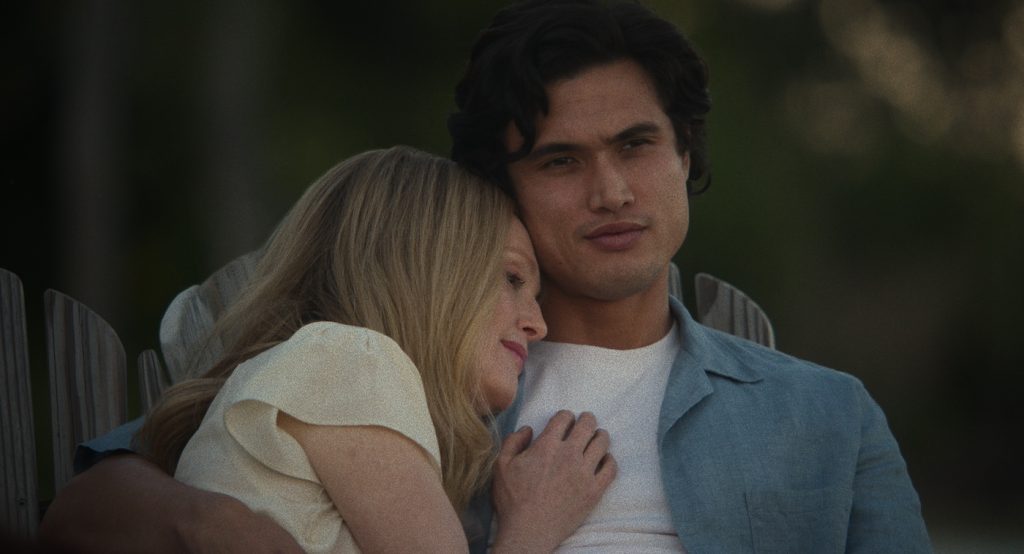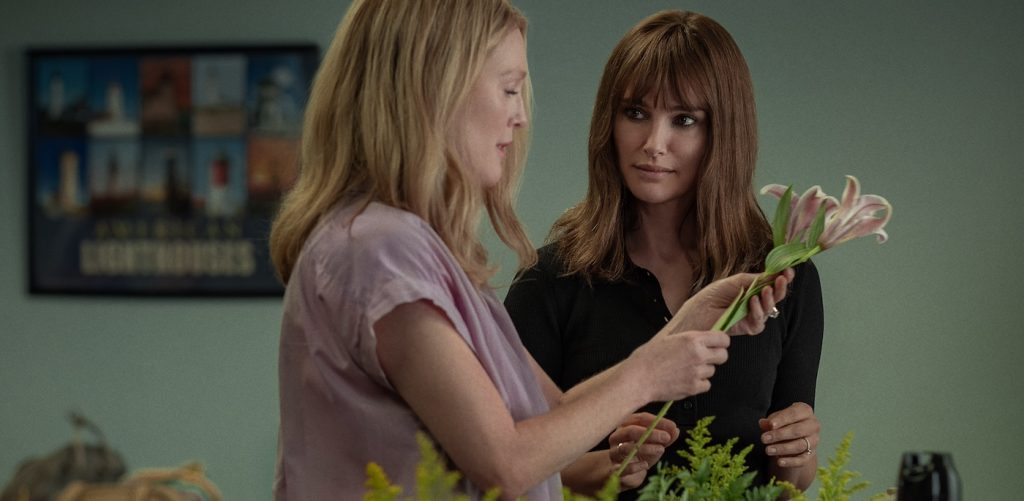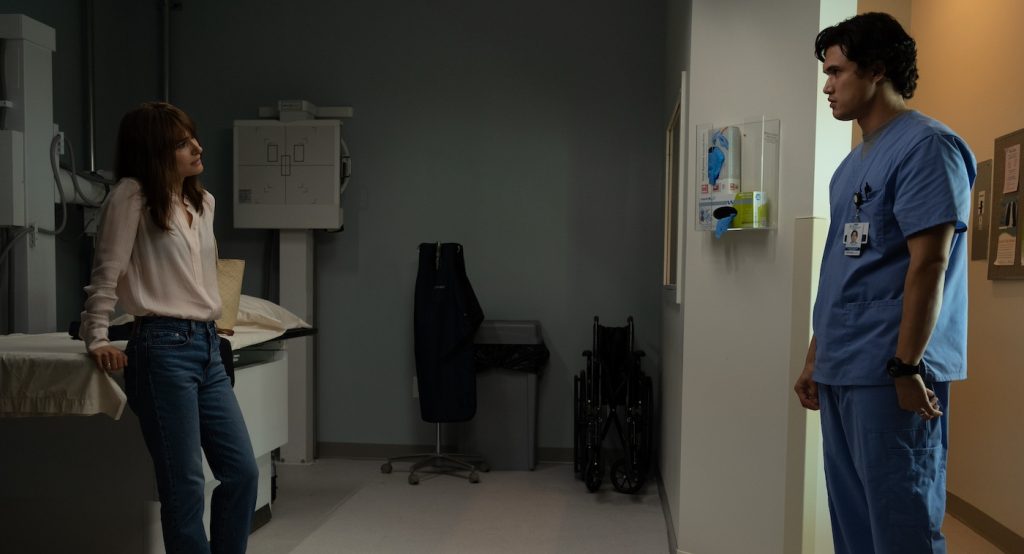“May December” Screenwriter Samy Burch Unpacks the Unspoken in Todd Haynes’ New Film
May December (in select theaters now), which probes the interior lives of three enigmas aswirl in their own isolating truths, might be 2023’s most debatable movie. Rarely does anyone in Todd Haynes’ film say what they actually mean, and although it remains playful and accessible, an intriguing inscrutability hovers around the central characters.
Gracie Atherton-Yoo (Julianne Moore), a steely circus freak within her upper-middle-class Georgia community, has convinced herself that she is not liable for the liaison she had with a teenage boy while working at a pet store. That boy is now her husband, Joe (Riverdale‘s Charles Melton), a somewhat stunted 36-year-old who caters to Gracie’s volatility with compassion. Joe hardly admits — to himself or to Gracie — how he feels about their history. When a famous TV actress named Elizabeth Berry (Natalie Portman) shows up to shadow Gracie before portraying her in what she insists will be a respectful movie, the seams of the couple’s life subtly unravel. May December doesn’t rest on some moral high ground, but it does impeach Hollywood leeches, predatory relationships, and tabloid projection. The latter is key because Gracie is based loosely on Mary Kay Letourneau, the Washington schoolteacher who, in 1997, pleaded guilty to raping her sixth-grade student Vili Fualaau, after which she gave birth in jail and later married him.
The female antiheroes in Samy Burch‘s Nesting Doll of a script evoke identity-swapping psychodramas like Persona and Mulholland Drive, while Haynes’ cheeky direction twists the melodrama tropes he employed in the comparatively refined Safe, Far From Heaven, and Carol. It’s fun to unpack what’s said — and, more crucially, what’s left unsaid — throughout May December, which opens with Elizabeth arriving at a barbeque that Gracie and Joe are hosting.
There’s a line toward the beginning that establishes both the tone of the movie and what Gracie’s mind is like. Do you know what I’m about to say?
The hot dogs.
Yes, “I don’t think we have enough hot dogs.” There’s a zoom and a dramatic music cue, and Julianne delivers the line like she’s found like a dead rat in her fridge. When you were writing it, did you intend for the line to be as crucial as Todd makes it?
The way it’s written in the script is something like, “A dark expression crosses Gracie’s face.” And then the next cut is the grill, and there are so, so many hot dogs. As a writer, I’m not thinking about the score or the camera, but the seed was there. It’s been a fun surprise to see the lines that people have been quoting.

It really does tell us so much about Gracie. She makes it sound like a life-or-death crisis.
That’s our first clue, potentially, that there are mood swings or dramatics involved with this personality.
Many details about Gracie hew closely to the real Mary Kay Letourneau story, but I want to ask about a couple of changes. First, the pet store. Why not use the teacher-student dynamic?
In some ways, the person that I envisioned as Gracie — her personality, her spirit — didn’t feel like a teacher to me. But I also think there was a conscious effort to fictionalize this with all the little details. The big-picture details are similar, but I wanted to invent names, places, their history, their families, their jobs. Initially, the script took place in Camden, Maine. I always saw her as somebody from a wealthy family who had married a husband who was caring for her. There’s just this hyper-femininity. We get a sense that she likes purebred dogs, and I thought of a neighborhood shop where she’s helping out the elderly owner. She was kind of working at this pet store as a hobby. There was something tabloid-y about this pet-shop romance that felt right. There’s got to be a hook to these things. And the teacher-student thing is often in the news, and I wanted to diverge from that. Being a friend of his mom’s and having them in this really close, unusual location just felt like the right choice. I liked the idea of all these little animals, like all these little witnesses.
Another choice is Gracie’s lisp. Was that Julianne’s invention?
Totally Julianne’s invention, and a really amazing one, especially given that there was no rehearsal and this movie was shot in 23 days. You can imagine the complication of Natalie’s character having to study Julianne’s character. She’s also talked about this infantilizing quality that Gracie has, which is present throughout. She holds a lot of power, but there is this very childish element. I think Gracie plays into this little girl that needs to be saved. It’s essential to who she is.

What kind of actress did you imagine Elizabeth to be in terms of fame and talent?
She went to Julliard, so I think there’s a certain base level of seriousness. She’s sort of an ingenue, probably on TV. She’s been on this show called Nora’s Ark. It’s an animal-hospital drama, and we kind of assume she’s the lead. It’s been on for a long time and is not good.

Do you think she knows it’s not good?
Oh, I think she for sure knows. I think she’s very embarrassed by it, and what drives so much of this plot is that she’s got something to prove. And then, as it goes on, we get a sense that maybe this movie they’re making isn’t good, but the research she’s doing is very lofty — let alone trying to get to the truth of something impossible to really get to, even with the people involved. It’s hard to say what the limitations of her talent are. I think, in a lot of ways, she’s very limited by her doubt and her insecurity, even while she’s brazen in the way she disrupts these people’s lives. What I love so much in Natalie’s performance is those flashes of insecurity. In some ways, that’s the comedy, but it’s also the tragedy of that character.

Do you think she’s invested in Gracie as a person at all beyond the opportunity for her own success?
It’s a really complicated dynamic because there are a lot of ways they circle each other. I think they do like being seen by the other. They like the reflection of themselves in each other’s eyes. I think Elizabeth thinks, “This is the moment I become a serious actress respected by the world.” What I love when rewatching the movie is seeing Elizabeth’s micro-expressions during some of the most uncomfortable moments. There’s a flinch sometimes where we know that she knows this is very fucked-up. But everything is trumped by her experience here in this town and how she’s telling herself that this is what acting is. I think there’s not that much ethical quandary.

That raises another question: How much of this movie is ultimately about the way Hollywood exploits people’s life experiences?
A lot of it is. I wouldn’t necessarily say it’s an indictment, but it calls into question the constant stream of mystery that is harvested from real people who are alive. In some ways, you can make an argument for that being a human desire and a cathartic one, given our society and how many horrible things can happen. And maybe there’s value to that storytelling, especially when it’s done well. It’s certainly not my intention for the main takeaway to be a scathing critique of true crime. It’s just interesting.
I feel like Joe would have been the most difficult character to write. Much of that character hinges on the performance, and yet he’s really the most sympathetic person despite not being particularly expressive. What unlocked Joe for you?
The honest truth is that he was the seed for me. I felt like I knew him right away. I felt like I had to protect him. A lot of that is in these very quiet moments. I love watching him watch This Old House. There’s an adolescence, obviously, to a lot of what we see him do. That was certainly part of the process of doing drafts once Todd was giving notes. Initially, I think Joe was able to articulate a little too much. Taking some of it back allows us to do that as the audience. The core idea of this movie is that this man is 36. He’s young enough to really be able to start over his life. He has not had a moment to process what happened to him or the media blitz that followed, which was probably unquantifiable. This moment, right before his last kids graduate from high school and they’re finally alone again, is the first time he can catch his breath, and he’s also crossing paths with this doppelgänger for his wife. There’s this eclipse that happens at age 36, the same age that Gracie was when they met. So they’re kind of on equal footing, and I think all of that is enough to shake loose something that he’s been trying so hard, subconsciously, to bury. I didn’t feel like I had to crack Joe because I felt like that’s what this was all about.

One of the juiciest details that you do borrow from Mary Kay Letourneau comes from the TV interview where she badgers Vili to say that he was the one in charge of their early courtship. It’s a wild moment.
That came later. There was a lot of research that Todd, Julianne, and Sam Lisenco, the amazing production designer, did. It was a moment that Todd felt strongly about and placed in the scene. I was trying to figure out the story for myself, and then there were coincidences of things ringing true with the real case. The line that’s always been there is, “You seduced me,” which is one of my favorite moments in a theater because it gets such an audible reaction. It’s so upsetting. But “who was in charge?” was added later. It’s a very good clue into the story that Gracie tells herself about what happened. And Joe’s reaction is so truthful. He seems stunned by that. These moments in the film are really few and far between where someone says something honest, and it feels like a relief because so much is not being said.
May December is in select theaters now, and streams on Netflix on December 1.
For more on big titles on Netflix, check these out:
“Rustin” Producers Tonia Davis and Bruce Cohen on the Urgent Message of Bayard Rustin’s Life
“The Killer” Cinematographer Erik Messerschmidt on Re-Teaming With David Fincher
How Cate Adams’ Costume Design Helped David Fincher’s “The Killer” Disappear
Featured image: May December. (L to R) Natalie Portman as Elizabeth Berry and Julianne Moore as Gracie Atherton-Yoo in May December. Cr. Francois Duhamel / courtesy of Netflix



